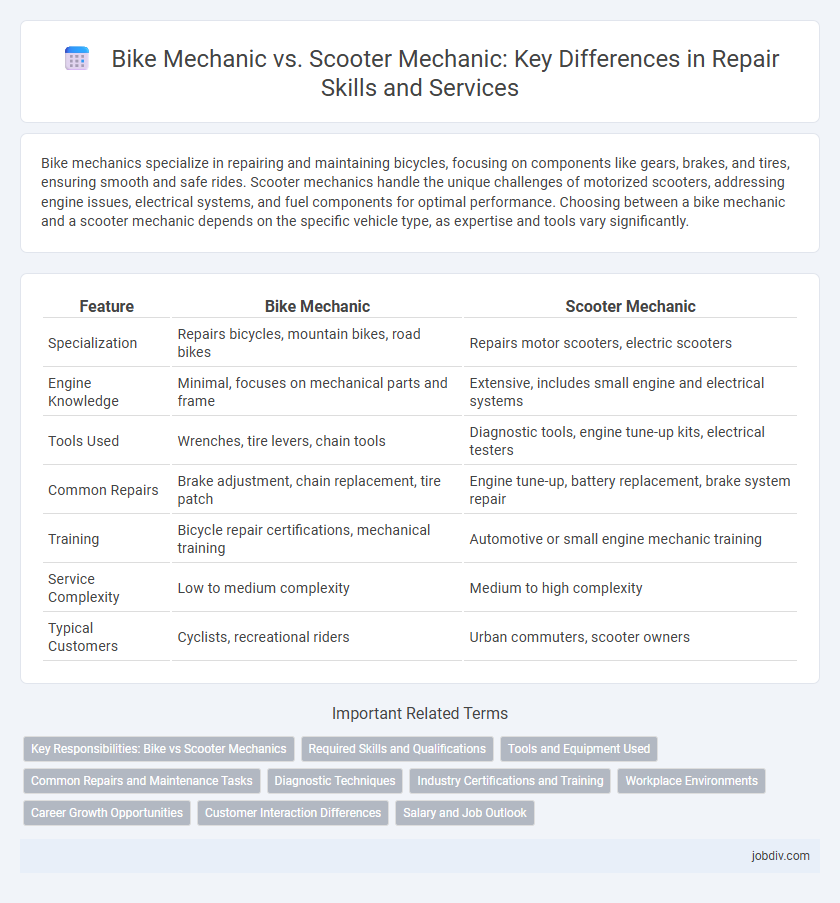Bike mechanics specialize in repairing and maintaining bicycles, focusing on components like gears, brakes, and tires, ensuring smooth and safe rides. Scooter mechanics handle the unique challenges of motorized scooters, addressing engine issues, electrical systems, and fuel components for optimal performance. Choosing between a bike mechanic and a scooter mechanic depends on the specific vehicle type, as expertise and tools vary significantly.
Table of Comparison
| Feature | Bike Mechanic | Scooter Mechanic |
|---|---|---|
| Specialization | Repairs bicycles, mountain bikes, road bikes | Repairs motor scooters, electric scooters |
| Engine Knowledge | Minimal, focuses on mechanical parts and frame | Extensive, includes small engine and electrical systems |
| Tools Used | Wrenches, tire levers, chain tools | Diagnostic tools, engine tune-up kits, electrical testers |
| Common Repairs | Brake adjustment, chain replacement, tire patch | Engine tune-up, battery replacement, brake system repair |
| Training | Bicycle repair certifications, mechanical training | Automotive or small engine mechanic training |
| Service Complexity | Low to medium complexity | Medium to high complexity |
| Typical Customers | Cyclists, recreational riders | Urban commuters, scooter owners |
Key Responsibilities: Bike vs Scooter Mechanics
Bike mechanics specialize in repairing and maintaining bicycles, focusing on components like gears, chains, brakes, and tires, ensuring smooth gear shifts, optimal braking performance, and proper wheel alignment. Scooter mechanics handle engine diagnostics, electrical systems, fuel injection, and exhaust repairs specific to motorized scooters, emphasizing engine tuning, battery maintenance, and throttle adjustments. Both roles require expertise in troubleshooting, but bike mechanics prioritize mechanical parts and rider ergonomics, whereas scooter mechanics focus on motorized engine efficiency and safety compliance.
Required Skills and Qualifications
Bike mechanics require expertise in maintaining and repairing complex gear systems, hydraulic brakes, and lightweight aluminum or carbon frames, often necessitating certifications like the Certified Bicycle Technician (CBT). Scooter mechanics must possess skills in diagnosing and fixing small engine issues, electrical systems, and battery management, typically benefiting from automotive or small engine repair certifications. Both roles demand strong mechanical aptitude, problem-solving abilities, and familiarity with specialized tools relevant to their respective vehicles.
Tools and Equipment Used
Bike mechanics typically rely on specialized hand tools such as torque wrenches, chain breakers, and spoke tension meters to perform precise adjustments and repairs on bicycles. Scooter mechanics frequently use diagnostic scanners, socket sets, and multimeters tailored to handle the electrical systems and small-engine components of scooters. Understanding the difference in tools and equipment highlights the technical skills required for efficient maintenance and repair in each field.
Common Repairs and Maintenance Tasks
Bike mechanics commonly handle tasks such as brake adjustments, tire replacements, chain lubrications, and gear tuning, ensuring optimal performance and safety for bicycles. Scooter mechanics specialize in engine diagnostics, battery replacements, carburetor cleaning, and electrical system repairs, focusing on maintaining motorized two-wheelers. Both professionals perform regular inspections, fluid changes, and brake system checks to guarantee reliable operation and rider safety.
Diagnostic Techniques
Bike mechanics rely heavily on manual inspection techniques such as chain tension checks, brake responsiveness tests, and gear shifting analysis to diagnose common issues. Scooter mechanics frequently use onboard diagnostic tools and electronic scanners to identify problems related to fuel injection, ignition systems, and battery health. Both rely on experience, but scooter diagnostics tend to integrate advanced technology for precise fault detection.
Industry Certifications and Training
Bike mechanics often hold certifications from organizations like the Professional Bicycle Mechanics Association (PBMA) and complete training focused on high-performance bicycles and complex gearing systems. Scooter mechanics typically receive certifications from manufacturers such as Honda or Yamaha and undergo specialized training tailored to electric and gas-powered scooter engines. Both fields emphasize industry-recognized credentials to ensure proficiency in repairing advanced components and maintaining safety standards.
Workplace Environments
Bike mechanics typically work in well-ventilated, spacious workshops equipped with specialized tools for gears and brakes, often in bicycle shops or sports stores. Scooter mechanics operate in more compact, sometimes urban-focused environments, such as motorized scooter repair shops or service bays, requiring diagnostic tools for engines and electrical systems. Both environments demand safety measures, but scooter workshops often emphasize ventilation and space for handling fuel-powered vehicles.
Career Growth Opportunities
Bike mechanics often experience broader career growth opportunities due to the higher demand for bicycle repairs in urban and recreational markets, with potential advancement into specialty fields such as electric bike maintenance and professional racing support. Scooter mechanics, while benefiting from the rising popularity of electric scooters, especially in shared urban mobility services, face more niche market constraints but can capitalize on emerging technologies in electric drivetrain and battery systems. Both career paths offer practical skill development, yet bike mechanics generally have access to larger markets and diverse job roles that contribute to accelerated professional growth.
Customer Interaction Differences
Bike mechanics often engage customers with detailed discussions about performance tuning and component upgrades, reflecting a focus on individualized customization. Scooter mechanics typically prioritize explaining maintenance tips and fuel efficiency improvements, addressing the practical needs of urban commuters. Communication styles differ as bike mechanics emphasize technical precision, while scooter mechanics foster a friendly, user-oriented approach.
Salary and Job Outlook
Bike mechanics typically earn an average salary ranging from $28,000 to $45,000 annually, while scooter mechanics often see slightly higher wages due to growing urban mobility demands, with averages between $30,000 and $50,000. Job outlook for scooter mechanics is projected to grow faster by 8% over the next decade, driven by increased scooter usage in cities, whereas bike mechanics face steady demand with a projected growth rate of about 5%. Both careers require specialized repair skills, but scooter mechanics benefit from emerging electric scooter markets and evolving technology trends impacting salary potential.
Bike Mechanic vs Scooter Mechanic Infographic

 jobdiv.com
jobdiv.com